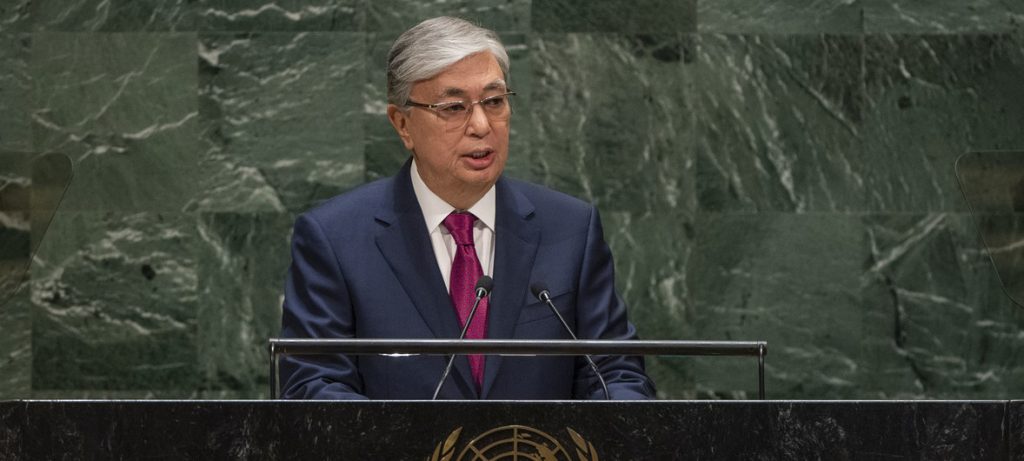
At the 57th session of the UN General Assembly, the President of Kazakhstan Kassym-Jomart Tokayev (above) proposed the establishment of the International Agency for Biological Safety (IABS), a specialised agency which will be accountable to the UN Security Council and be guided by the 1972 Biological Weapons Convention.
It is based on the conviction that modern threats, like the COVID-19 pandemic, require a collective and collaborative approach at the national, regional and international levels for the safety of all humankind
Rapid climate change and destructive human behaviour are causing a sharp increase in the spread of new, dangerous pathogens. In the context of wider turbulence and global instability, there is a growing need for the UN Security Council to address biological safety as an emerging global security threat.
The proposal is intended to address existing gaps:
* The COVID-19 pandemic has provided ample illustration of the danger of mass infections, the risks of being unprepared and the potentially destructive force of a bacteriological weapon.
* The possibility of bioterrorism — that dangerous bacteriological agents could fall into the hands of terrorists. It’s a weakness of the 1972 BWC regime that must now be addressed.
* There have been accusations that the COVID-19 virus was man-made and that it leaked from a laboratory or was part
of a biological weapons programme. Such controversies are disruptive and destructive and erodes international solidarity. It underlines the urgent need for a competent international body to fight disinformation related to biosafety events.
* Even research and development of bioagents for peaceful purposes carry risks for the population of a country, as these could be released into the environment. Advances in biosciences and biotechnology increase these risks and must be addressed.
* The laboratory-controlled possession and research and development of pathogens is necessary for preventing and combating some diseases. Compliance or non-compliance with the BWC is therefore determined partially by the intended use of pathogens. This makes verification and trust between countries, non-governmental organisations, experts and scientists more difficult. COVID-19 has exposed the lack of trust when it comes to the break-out or misuse of major pathogens.
According to the Kazakh proposal, the mission of the proposed Agency will be to advance peace, health and well-being of all by initiating and ensuring safety and control measures related to potential biological and biotechnological threats and by promoting biological development for peaceful purposes.
The Agency will be guided by the goals and principles of the UN Charter which is aimed at maintaining peace and international security and strengthening international cooperation in order to ensure biological safety, It will be
accountable to the UN Security Council, which is the main body for maintaining peace and international security.
IABS’s main activities will be preventing the diversion of biological developments for military purposes and promoting biological research and development.
It will have to cooperate closely with WHO and other international organisations in relation to human, animal and plant-related diseases.
The creation of the new Agency should be coordinated with the ongoing reforms of the WHO to avoid duplication and enhance functional complementarity.
IABS’ objectives:
* Support the regime of non-proliferation of weapons of mass destruction and the prohibition of biological (bacteriological) and toxin weapons.
*Assist in ensuring the general health and biological safety of the population.
* Create a database of the types of assistance that can be provided to a country affected by the violation of the provisions of the BWC.
*Establish a multilateral export control mechanism based on the principles of inclusiveness and fairness and the fundamental principles of the Australia Group.
*Create a system of checks and guarantees to ensure that programmes and developments in the biological field will be used for only peaceful purposes.
* Increase the technical capacity of BWC member states in the area of biological and biotechnological safety, including the development of regulations and standards setting.
* Encourage international cooperation in the research and development of measures to combat dangerous pathogens and the exchange of scientific data,
* Strengthen confidence-building measures and transparency.
IABS’ functions:
* Oversee and control developments in modern biological technologies.
* Assess the possible dual uses of biotechnologies.
* Prevent the use of advances in biosciences and biotechnology for the creation of biological weapons.
* Develop a system of guarantees to prevent the use of scientific developments for the creation of biological weapons.
* Prevent the spread of dangerous pathogens outside the laboratory.
* Increase the capacity of the BWC member states to detect and combat biological threats.
* Exchange information on outbreaks of infectious diseases and similar situations caused by toxins.
* Coordinate requests for emergency assistance in accordance with Article VII of the BWC in cases where a State Party is at risk.
* Assist in organising international projects in vaccine development against infectious diseases and ensure their availability to all countries.
* Promote research work in biological safety, the protection of public health and the environment in ecologically vulnerable regions of the world, as well as the development of measures to combat dangerous pathogens.
* Encourage research and development to combat dangerous pathogens.
* Review scientific research and technological achievements and exchange of scientific and technological information on dangerous pathogens and measures to combat them.
* Cooperate with scientific and technological centers to develop biological means of defense available to all states against dangerous pathogens, both active and potential.
* Create and update the UN Register of scientific discoveries in the field of biology that can be used for military purposes;
* Compile and analyse annual mandatory reports and declarations on BWC Confidence Building Measures.
* Create a catalogue of Confidence Building Measures in biological safety.
Organisation and scope of IABS
The legal basis for the establishment and operation of IABS is the 1972 Convention on the Prohibition of the Development, Production and Stockpiling of Bacteriological (Biological) and Toxin Weapons and on their Destruction (BWC).
The Agency can be created following the example of the IAEA (including taking into account the experience of the OPCW and the CTBTO), with mandated powers to conduct inspection activities and, accordingly, have a concise and efficient staff of specialists in the field of biosafety.
An important element of IABS’s work should be the Catalogue of Confidence Building Measures, which can provide the necessary predictability and transparency of biological activities of states.
The IABS is proposed as an organisation affiliated to the UN and associated with it by a special agreement, providing periodic reports on its work to the Security Council and the UN General Assembly. The Agency will also work closely with:
* UNODA (which serves as the secretariat for the BWC ).
* OPCW (as the international chemical weapons oversight body, it has advanced laboratories with the capacity to conduct biological research).
* IAEA (as the international nuclear oversight body, it offers an integrated, multisectoral and interdisciplinary approach in the fight against zoonotic diseases through the new ZODIAC initiative).
The IABS will be an inter-governmental organisation of all interested countries, primarily the BWC member states. When developing the Agency’s charter, emphasis should be placed primarily on ensuring the health and safety of human
life, the exchange of scientific and technological information on studies of dangerous pathogens and measures to combat them, with subsequent steps to develop a system of guarantees for the use of scientific developments only for peaceful purposes (following the example of the IAEA).
Given the fragmentation of much of biotechnology research and its lack of transparency, it is necessary to develop comprehensive global principles for the management and regulation of biotechnology, supported by a flexible safety and
security regulatory framework.
IABS structure
A small compact staff with sufficient expertise and capacity in biosafety, based on the principle of equitable geographical representation. Taking into account the current situation, as well as the budget allocated for it, it would recruit and employ part of its staff remotely in different countries.
The IABS would be funded through Member State dues in accordance with the UN scale of assessment. Financial and administrative issues will require additional negotiations after conceptual agreement is secured.












